
Marion Owen, 'Fearless Weeder' and co-author of Chicken Soup for the Gardener's Soul
 Finally, a fertilizer that is:
Finally, a fertilizer that is:
1) Blended from all natural and organic ingredients for indoor and outdoor plants
2) Safe to use on all edible plants and around kids and pets.
Yeah, yeah, yeah. But here's the best part: It doesn't smell bad!
FEATURE ARTICLE:

Tom Hanks' "Power of Four" solution
More good stuff:
Who is Marion Owen?
FAQs about PlanTea
Search Marion's articles, tips and recipes
Why grow organic?
News and press releases
Read love letters
How to link to this site
Need a speaker?
How to contact Marion
Visiting Alaska?
Come to Kodiak Island!
Go to home page

Marion's UpBeet Gardener
Newsletter has been
replaced by Marion's blog
which you can find at:
www.marionowen.wordpress.com
One of the most satisfying results of your gardening labors is to have healthy plants without resorting to chemicals. That's why I developed PlanTea. And I'm guessing you are here because you are searching for a solution:
I started my long search for an easy-to-use, but convenient, organic fertilizer for home gardening back in 1994. I finally ended up developing my own, in a blender (the story follows later).
When you hold a PlanTea pillow in your hand, take a sniff. You catch a whiff of sweetness in the dried flowers and vegetables; and a touch of salt air in the dried kelp. Yes, it smells sweet. Imagine, a plant food that smells sweet.
PlanTea not only smells good, it's a pretty good, organic fertilizer. (Read love letters from my customers.) What's more, PlanTea, provides you with:
- Confidence that your plants will look better today than yesterday.
- Confidence that PlanTea is safe: You can use it around children and pets. In fact, PlanTea is listed with the Organic Materials Review Institute (OMRI). You can read more about that below.
 Confidence that PlanTea is free of Genetically Modified Organisms (GMO's), chemicals and... worries!
Confidence that PlanTea is free of Genetically Modified Organisms (GMO's), chemicals and... worries!
- Confidence that you can't burn your plants with PlanTea, like you can with chemical fertilizers.
- Confidence that you'll enjoy using PlanTea: Just brew it like a pot of tea. The liquid turns pink! (I'll explain later)
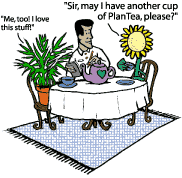 Confidence that PlanTea smells sweet. At least your plants will think so, because PlanTea is made from dried vegetables, herbs, kelp and flowers.
Confidence that PlanTea smells sweet. At least your plants will think so, because PlanTea is made from dried vegetables, herbs, kelp and flowers.
- Confidence that you and your plants will enjoy having PlanTea in your lives. And your neighbors will wonder why your plants are so happy!
The bottom line is, you want your plants to look good and stay healthy--with little fuss. Yet the word "fertilizer" doesn't exactly bring up thoughts of joy and enthusiasm. (Unless you're Kathy Reyes of New York, who says, "I love PanTea! My indoor plants look alive again!")
As I mentioned, PlanTea is listed with the Organic Materials Review Institute (OMRI). Products that show the OMRI Listed® seal have gone through OMRI's Product Review process, and have been found by OMRI to be Allowed or Restricted according to the USDA's National Organic Program (NOP) regulations. The materials and processes used in these products are evaluated by OMRI's Review Panel--a national board of experts from the organic industry.
What does all this mean for you? PlanTea (plant + tea) is made from all natural and certified organic ingredients, which means it is safe to use on all your plants, indoor and outdoors. And, it is safe to use around kids and pets. The bottom line? You can sleep at night!
PlanTea is easy to make and use. Just brew like regular tea: Drop a tea bag in a container and add hot water. The dried ingredients come alive to deliver a nutrition-packed cornucopia to your houseplants, seedlings and container gardens; roses, herbs and orchids. PlanTea is gentle, but delivers a healthy punch, no pun intended. And it does not burn plants or cause salt buildup like chemical fertilizers do.
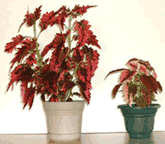
Left: Grown with PlanTea.
Right: Without PlanTea (Sorry Charlie!)
Each tea bag makes 2 cups of concentrate, which you can use as is, or dilute to make 5 gallons of spray. Each box of PlanTea contains everything you need for healthy, lively plants: 12 tea bags, complete instructions and a personal note from Marion Owen, PlanTea founder.
PlanTea is lightweight and stable, which means it has a long shelf life, and it doesn't cost an arm and a leg when we ship it to you. To buy PlanTea, click here. As soon as you place your order, we immediately send you an e-mail confirmation. You can also order by phone (call toll free 1-800-253-6331 from the U.S. and Canada) and by regular mail. We're an equal-ordering business!
Below you'll find more helpful information and FAQ's:
Why organic fertilizers are better
Chemical fertilizers are salts, manufactured from coal or natural gas, which are non-renewable resources. The chemical salts "suck the life right out of the benefical soil microbes," the very heart of healthy soil, says Jeff Lowenfels, co-author of Teaming With Microbes: A Gardener's Guide to the Soil Food Web. Chemical fertilizers provide only a fraction of nutrients a plant needs and they can burn plant roots.
What about the soil itself? Over time, synthetic fertiliers acidify the soil and damage the structure of the soil, causing it to compress into a lifeless brick. That spells trouble because the soil can no longer hold -- and deliver -- water, air and nutrients to your plants. Oh, and then there's water pollution; and our food is less healthy, especially for kids who are most affected by pollution. Read the special link on what industry experts say about 'organics.'
Bottom line: Synthetic fertilizers provide impressive results in the short term, but once you start using them, like an addiction, you have to keep using them.
Call in the heroes!
Organics, like compost and mulch (and PlanTea) greatly improve your soil, whether in a potted houseplant or a tray of seedlings. This means your homegrown broccoli and tomatoes taste better. And your prize petunias will resist pests and survive nasty weather better than their chemical-fed cousins. But you don't have to take our word for it, read what others have to say.
FAQ's about PlanTea

What's inside those tea bags?
Each unbleached tea bag contains 12, certified organic ingredients. These include:
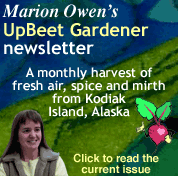 Kelp
Kelp- Rock phosphate
- Fish bone meal
- Greensand
- Dried herbs and flowers
- Parsley
- Beet powder
- Carrot powder
- Oak leaves
- Love
PlanTea balanced blend has N-P-K values of 1.75 - 18.00 - 1.98.
PlanTea is gentle, yet very effective. You can see that the middle number, P, is fairly high, which means PlanTea contains a healthy amount of phosphorus, important for flowering and fruiting plants, trees and shrubs.
But don't be misled by the N-P-K numbers that suggest organic fertilizers are not as good as chemicals. It is actually far better because it feeds and builds the soil while it nourishes the plants. This is one of the primary ways that organic fertilizers have a leg-up on chemical ones. (For more information about comparing N-P-K values, read my Manure Matters article.)
PlanTea also contains a healthy handful of micro-nutrients such as calcium, sulfur, sodium, zinc, iron, boron, chromium, silicon, copper, manganese, and molybdenum. And you can't burn plants with PlanTea, plus it doesn't contribute to the buildup of toxic salts -- that white, crusty residue left from chemical fertilizers.

What is greensand?
Greensand, which is also called greensand marl or glauconite greensand, is an undersea mineral deposit. In fact, it's 75-million years old! Greensand is a rich, olive green color and it contains many important elements naturally found in sea water. It is a rich source of potassium (K) and some 30 other minerals that are important to plants such as silica (Si), magnesium (Mg) and phosphorus (P). Learn more organic gardening tips.
Does the fish bone meal smell bad?
Unlike other fish-based fertilizers, the fish meal in PlanTea is a bone meal, which means it doesn't smell fishy. Fish bone meal is an excellent source of nitrogen (N) and phosphorus (P). Phosphorus is an important mineral for bulbs, flowers and fruit formation.
 How do you make PlanTea?
How do you make PlanTea?
Making PlanTea is as easy as making a cup of tea for yourself. Just, place a tea bag into a heatproof container. Add 2 cups very hot or boiling water. Cover and steep for 30 minutes or as long as overnight. Cool and stir before use.
There's no mess or funny smells. Remember, it's kid and pet-safe. In fact, one of our customers told us she'd accidentally sprayed PlanTea on her hair, which made it shine better than ever! (Read more customer comments.)
How do you use PlanTea?
PlanTea can be applied in many ways. Simply find the approach that's easiest for you. It can be applied with a watering can or spray bottle, or poured directly onto the soil. Each box of PlanTea contains 12 tea bags and complete instructions. Store any remaining PlanTea concentrate in the fridge for up to 2 weeks or freeze it in ice cube trays. You can recycle the used tea bag by stirring the contents into soil.
How much and how often?
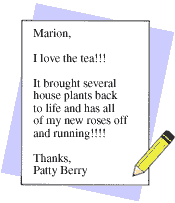 Most indoor and outdoor plants benefit from a feeding every 2 to 3 weeks during their growing season, with a reduced feeding frequency during winter and other slow-growth periods. PlanTea's formula is so gentle, that even if you use extra, it won't burn your plants.
Most indoor and outdoor plants benefit from a feeding every 2 to 3 weeks during their growing season, with a reduced feeding frequency during winter and other slow-growth periods. PlanTea's formula is so gentle, that even if you use extra, it won't burn your plants.
Serving suggestions:
- Using the concentrate: Pour undiluted concentrate directly onto the soil. As a general guide, use approximately 1/2 cup concentrate for an 8-inch pot. Or, if you prefer to feed and water at the same time, add a ratio of 1/2 cup concentrate to 1 gallon of water.
- As a foliar spray
Fill a spray bottle with 1 tablespoon concentrate for each quart water. Thus, each tea bag makes almost 5 gallons of foliar sprayPlants absorb nutrients 20 times faster through their leaf pores. Foliar sprays are particularly beneficial for seedlings and plants stressed from drought, transplant shock or other conditions.
- For seedlings and transplants
PlanTea is gentle and easy to absorb, making it an ideal "baby food." Plants raised on PlanTea are able to fend off pests, transplant shock and damping-off disease. Start feeding seedlings as soon as they develop their second pair of leaves. Use the foliar spray dilution (above), and apply it weekly directly onto the soil and/or by spritzing your plants with a spray bottle.
Why does PlanTea turn PINK?
When we tested our first batch of PlanTea, we put a tea bag in a jar and poured boiling water over it. Suddenly the liquid turned a fuchsia pink color. We laughed, realizing the pink color was caused by the dried beets!

How to ruin a perfectly good blender!
(The rest of the story behind PlanTea)
I moved to Kodiak Island in 1984. Talk about training grounds! I set up a garden across the street from the ocean. I had access to kelp, a variety of manure, dried leaves, even fish bone meal. When it came time to feeding my seedlings and bedding plants though, I was disappointed with the commercial products on the market. So I decided to make my own.
After learning that kelp was extremely beneficial for plant health (Good book: Seaweed and Plant Growth by T.L. Senn), so I ventured to the beach and filled a bucket with seaweed. On the way home I gathered dried leaves, grass clippings and other goodies.
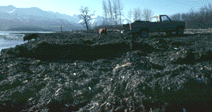
Gardeners in Kodiak, Alaska collecting kelp. Loaded with minerals and
nutrients, studies show that kelp is one of the best materials
you can give your plants. (Marion Owen photo)
I packed the blender and hit "blend." The mixture looked awful, but I strained it and fed it to my plants anyway. By golly, they began to look better, healthier. One day, after mixing a batch, I sat down with a cup of tea. I glanced down at the tea bag and watched it bob in the mug. I discovered my answer. PlanTea was born.
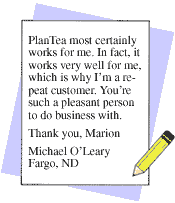 Today, PlanTea is made in California at a certified organic tea-bagging facility. What's more, PlanTea is fully tested, patented (though plants don't care about that stuff) and is listed as an "allowed organic fertilizer" with the Organic Materials Review Institute. Feeding your plants PlanTea is giving them the best plant food there is. Bar none.
Today, PlanTea is made in California at a certified organic tea-bagging facility. What's more, PlanTea is fully tested, patented (though plants don't care about that stuff) and is listed as an "allowed organic fertilizer" with the Organic Materials Review Institute. Feeding your plants PlanTea is giving them the best plant food there is. Bar none.
Using PlanTea will change the way you feel about caring for your plants. It's a subtle, gentle thing. An attitude, really. Give it a try. If you're not satisfied with the results, I'll gladly send you a refund.
Your plants deserve the best care. And remember:
Friends don't let friends use chemical fertilizers!
If you have any questions or comments, please send me an email.
Cheers, Marion (Fearless Weeder)
![]()
Thanks for visiting and please stop by again. I'll put the coffee on!
Meet Marion Owen /// Learn about PlanTea /// Online Catalog /// Articles, Tips, Recipes /// Get free UpBeet Gardener newsletter /// Read current issue /// Listen to radio show /// Read news and press releases /// More resources and links /// Learn why 'grow organic?' /// View guidelines for retailers /// Read love letters /// Book Marion as a speaker /// Site map /// How to link to us /// Contact us /// Go to home page
PlanTea: The organic plant food in tea bags. http://www.plantea.com
Copyright ©1996 to present: PlanTea, Inc. All Rights Reserved. PO Box 1980, Kodiak, AK 99615-1980 USA
Questions or comments? marion@plantea.com Phone: Toll Free: 1-800-253-6331 (US and Canada); 907-486-2500